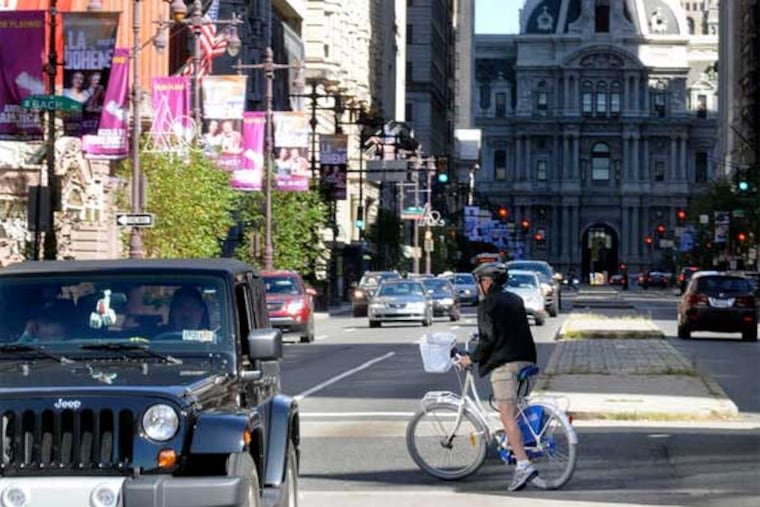Nutter to seek Council appropriation for Philadelphia bike-share program
The Nutter administration plans to seek $3 million from Philadelphia City Council for a "bike share" program that would put the first 650 bicycles on the street by early 2014, the deputy mayor for transportation, Rina Cutler, said Friday.

The Nutter administration plans to seek $3 million from Philadelphia City Council for a "bike share" program that would put the first 650 bicycles on the street by early 2014, the deputy mayor for transportation, Rina Cutler, said Friday.
A second phase would add 550 bikes in 2015, city officials said.
The program envisions 120 stations where commuters, tourists, or shoppers could help themselves to a bike that they would then leave at a station near their destination.
To take a bike, a rider would need to buy a daily, monthly, or annual membership from a vending machine at a bike station. Then the first half-hour on the bike would be free, with costs of about $5 per half-hour after that, based on the experience of other cities with bike-share programs.
The city envisions contributing $3 million, with an additional $5 million to $6 million from federal, state or private funds, to buy the bikes, set up the stations, and establish the program.
The operating costs of the program are to be paid for by riders, advertising on bikes and stations, and corporate sponsors, under the city's plan. City officials estimate operating costs will be about $23,000 per 10-bike station per year.
The area to be served by the bikes, at least at first, would be from the Delaware River to about 41st Street in West Philadelphia, and from South Street north to Temple University.
The bikes typically are heavy (about 40 pounds) three-speed models with broad seats, step-through frames, fenders, and wire baskets. Their very unhipness may be a deterrent to theft, said Andrew Stober, Cutler's chief of staff.
Next week, the Pennsylvania Environmental Council will issue a request for proposals to develop a business plan for the bike-share program, to refine cost estimates and operating plans.
Next spring, the city will then ask companies to bid to operate the program.
The administration will ask Council for $1.5 million a year in each of the next two years to launch the bike-share program, Cutler said Friday.
"This is something we've been looking at for five years," she said. "We've had some city envy, looking at cities with bike share, and people have been saying to us, 'When are you going to get bike share?' Well, now we are."
She said cities such as Washington, Boston, and Minneapolis have had great success with bike-share programs. Philadelphia waited, she said, to establish more bike lanes and bike-friendly streets before launching bike sharing.
Two issues that Philadelphia planners will have to grapple with are how to allow people without credit or debit cards to use the bikes and how to deal with the helmet question.
Most bike-share programs require users to pay for the bikes with a bank card. That way, the user can be assessed a several-hundred-dollar penalty if the bike is not returned.
But that can prevent people without bank cards from using the system, effectively eliminating many low-income users.
"We have to figure out a model so that folks who don't have a credit card or ATM card can readily have access to this," Cutler said. "Those are populations we must and want to serve."
The helmet question is: How does one encourage or require riders to wear helmets without discouraging use of the bikes?
The short answer, apparently, is one doesn't.
"It's remarkably difficult to figure out," said Alex Doty, executive director of the Bicycle Coalition of Greater Philadelphia. "The nature of how people are riding these is, they're not going very fast. The bikes are big, heavy, plodding things. And the cars in Center City are not going really fast."
"While we want people to wear helmets, we don't have hordes of riders being killed because they're not wearing a helmet."
Russell Meddin, the founder of Bike Share Philadelphia and a longtime advocate of the concept, hailed the administration's announcement.
"I think anything that will bring bike sharing to Philadelphia is great. It's been a hard road," he said. "We've been working on this for six years."
He urged city officials to plan for more bikes and more use than currently envisioned.
"Washington, Minneapolis, Boston - they're all playing incredible catch-up now to fill out their systems because they didn't start with enough."